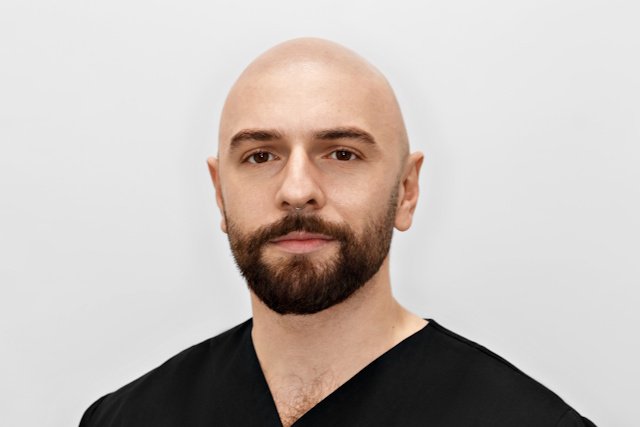Dental prosthetics
Dental prosthetics will help you restore healthy teeth. This is one of the simplest and fastest ways that will soon allow you to enjoy a well-groomed smile and daily victories again. Thanks to modern prosthetics dentistry technologies, you can get perfect dentures on the same day. All teeth can be restored during the procedure. Dentures in just 1 day!
L E A R N M O R E →
1/ Dentists
4/ Advantages of dental prosthetics
5/ The cost of dental prosthetics services
6/ What should you know about dental prosthetics and its methods?
7/ The course of the dental prosthetics procedure
8/ Types of dental prosthetics
9/ What care is required after dental prosthetics?
10/ How to take proper care of the teeth after dental prosthetics?
Procedures are carried out by:
Completed works
01
Dental prosthetics

02
Zirconia dental crowns
The patient came to us with badly worn, crumbling teeth. After waxing and “trying on” the new smile, we raised the bite height, restored the teeth with minimally invasive zirconia ceramic crowns and veneers. We restored the last teeth to the bite height by performing an aesthetic functional filling. After prosthetics, a protective night cap of the upper jaw was made.
It took 4 visits to create this perfect smile: 2 visits for lower teeth and 2 visits for upper dentures.
If you want to see teeth crown before and after, please look at the attached photos.

03
Dental prosthetics
The patient was not satisfied with the aesthetic appearance of the front tooth restorations. Correction of the gum was performed. The ceramic restorations of the front teeth were replaced with new ones, the colour range and shape of which harmoniously match the adjacent teeth.
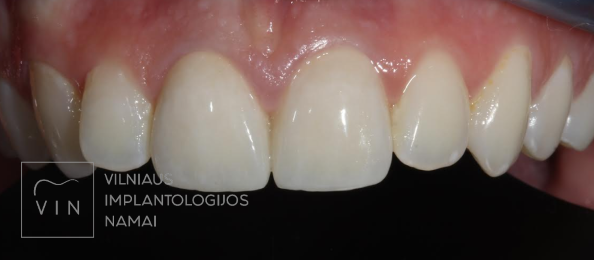
04
E-MAX metal-free ceramic crowns and dental veneers
The patient dreamed of a beautiful smile all her life, and finally decided to get it! After removing the old stamped metal-plastic bridge for one tooth, the missing front tooth was restored with an implant, 6 front teeth were restored with metal-free ceramic EMAX laminates and front teeth crowns.
Can you guess which tooth is implanted?

When can dentures help?
Dental prosthetics will allow you to quickly enjoy a beautiful smile again in case:
/ the tooth was damaged (tooth decay, cracks, injuries, etc.);
/ the tooth was lost due to trauma, infection or accident;
/ the tooth was unnaturally worn due to bruxism (“teeth grinding” at night);
/ worn teeth due to old dentures;
/ damaged old prosthetics, dental caps, bridges, crowns, etc.;
/ you feel constant pain and discomfort while eating;
/ you have lost your teeth due to diseases;
/ you have lost teeth or gums due to cancer in the mouth area.
Advantages of dental prosthetics:
/ Restores beauty to facial features, restores self-confidence.
/ Allows you to chew food well, can help you enjoy a healthier digestive system.
/ Facilitates speaking and articulation.
/ Protects the remaining teeth from splitting, breaking and other possible defects.
/ Prevents changes in the teeth bite.
/ The jaw joint does not hurt due to lost teeth and altered bite.
Kainos
Dental dentures near me: The cost of prosthetics is only €579* for one tooth.
The final price of the dental prosthetics depends on the number of teeth that require it and the type of dentures chosen. Before dentures are placed, the clinic’s doctors usually create a treatment plan that includes procedures such as oral hygiene and may also include endodontic or therapeutic treatment. Dentures are applied on the teeth only when they are fully prepared. This allows to ensure the longevity of the prosthetics and a high-quality treatment result.
* price per molar tooth. Imprint, consultation, anaesthesia are not included.
Prices of the most popular services:
Zirconia dental crown (back/front)
Financing options
Dental prosthetics and its cost: the price of this procedure can always be friendly to our patients. For those who cannot pay the full amount at once, we offer to pay for the treatment in parts. Our partners Inbank will help you to cover dental bridges cost, teeth crowns cost and purchase the dental prosthetics service in installments.
Other possible financing options:
/ Billing with health insurance funds when the patient has concluded a contract with the insurance company.
/ Funding from territorial health insurance funds for patients covered by mandatory health insurance.
What should you know about dental prosthetics and its methods?
/ Dental prosthetics is the restoration of a tooth using various methods. A tooth can be restored due to partial loss or after complete loss. Restoration is performed with crowns, bridges, plates, veneers, etc.
/ You can choose fixed dental prosthetics or removable dental prosthetics.
/ When choosing the best prosthetic method, it is necessary to take into account not only your financial capabilities, but also the overall health of your mouth. Only a dentist can assess it in the best way, so the first step is a consultation with them. Dental prosthetics in our dental clinic in Vilnius, can be performed in one day, i.e. you arrive in the morning and leave in the evening with a new smile!
Of course, before that, you need to come for a consultation and schedule visits in advance so that the doctors can prepare for the full procedure, saving you an additional visit. In case you are not familiar with dental products at all, the doctors can also answer even very simple questions like what is teeth crown, how much are dental plates or show partial dental plates pictures to help you form a better opinion.
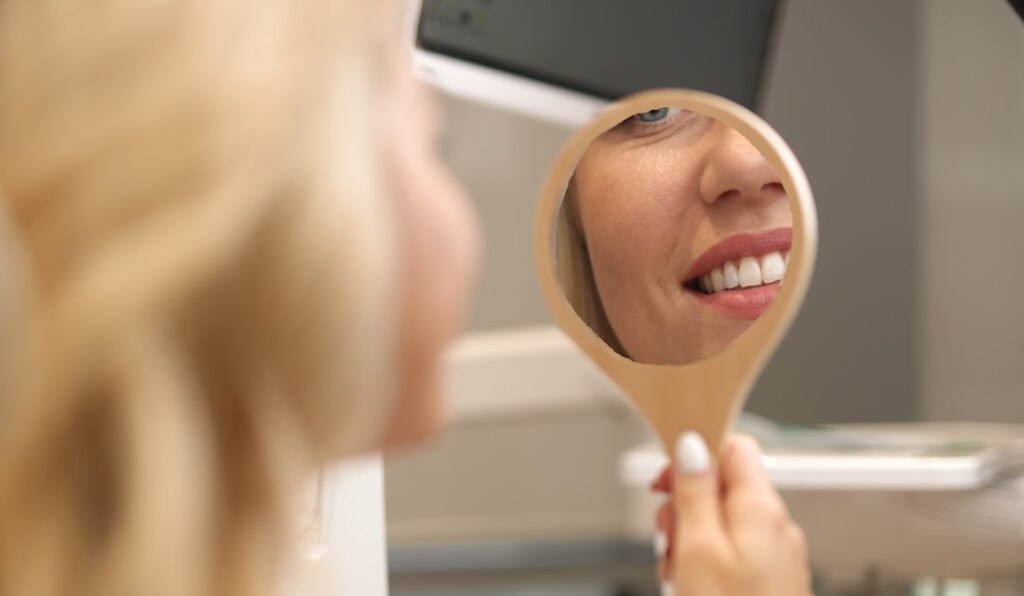
The course of the dental prosthetics procedure
01
Digital scan of the mouth
A digital scan of the mouth is performed (a digital imprint is made). The price of a digital imprint does not differ from a regular imprint, but it does not cause discomfort. During the standard imprint process, an imprint material is placed in the patient’s mouth, which can irritate the throat, and patients often feel nauseous.
Making a digital imprint is a completely painless and non-invasive procedure that takes less time than making of conventional imprint and is much more accurate.
02
Production of the dental crown
The digital imprint is instantly sent to the technician’s laboratory, where the production of the dental crown begins immediately. Tooth milling takes about 15 minutes. After that, the careful hand of the dental technician perfects the tooth and it looks like a real, natural tooth of yours. The metal-free ceramics that are used give perfect naturalness to the teeth.
03
Dentures in 1 day
And THAT’S ALL! Dentures are brought to our doctors and we put them on within an hour! You can smile on the same day! After planning the visit in advance, we can make dentures and give them to you in one day.
The price and technique of dental prosthetics differ from aesthetic filling.
Our clinic provides services to people living abroad: after planning visits in advance, we can beautify your smile in two to three days.
Register for VIDEO consultations
Types of dental prosthetics
Zirconia Ceramics | Metal-free ceramic | Metal teeth crown
Dental crowns
Zirconia ceramic material | Metal-free ceramic | Metal teeth crown
A severely damaged tooth can be repaired with a dental crown. If the tooth has been severely damaged by caries and has been filled several times, it may darken, especially after endodontic treatment. In this case, the crown not only strengthens the tooth, but also makes it look like a normal tooth. Likewise, if the tooth was removed and an implant was inserted, the crown is attached to the implant.
The cost of dental prosthetics depends on several factors:
/ chosen material of the crown;
/ type of tooth – front or molar, also whether prosthetics are placed on an implant or on one’s own tooth.
Zirconia ceramic
Tooth crown from zirconia is extremely strong, but such crowns are not transparent, so they are mostly used for molars, where extremely high resistance to loads is required. Zirconia ceramics are almost the same in price as metal-free ceramics, but they are stronger and as such, tooth crown from zirconia is often recommended, especially at a younger age, when the teeth will still have to reliably serve for a long time.
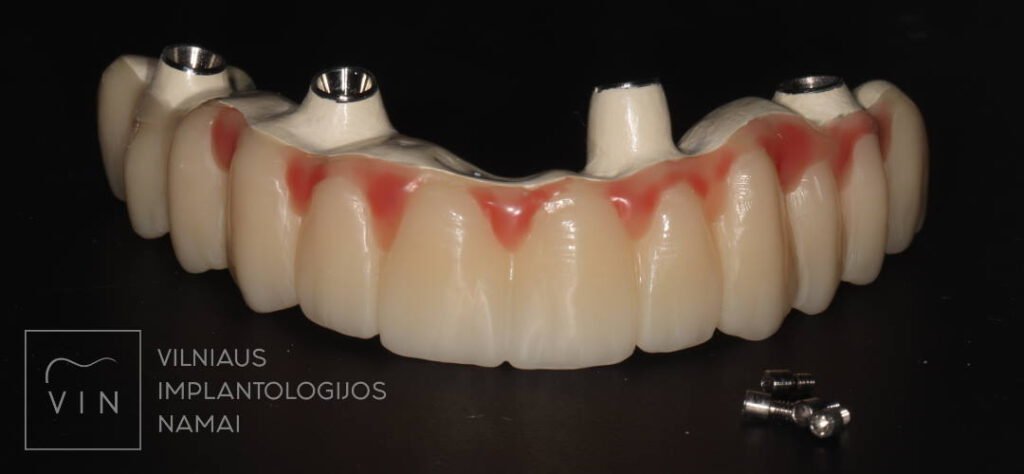
Metal-free ceramic

Metal ceramic dental crown
These dental ceramic crowns consist of two layers – the lower one is made of metal and the upper one is made of ceramic – thus creating the most natural appearance of the tooth. Metal ceramic dental crown is less transparent than metal-free ceramics, but such metal teeth crown is stronger. Metal teeth ceramics crowns are recommended for older people or molar teeth that are farther away.

Dental veneers
Composite dental veneers are the best method of dental prosthetics if the remaining teeth are not severely damaged. Composite dental veneers are made of porcelain and are extremely thin. They are placed on top of the remaining part of the healthy tooth, thus preserving the natural tooth as much as possible, but at the same time ensuring the aesthetic appearance of the teeth and providing functional benefits.
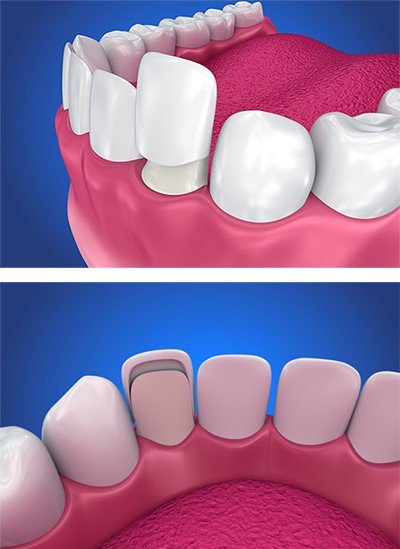
Dental bridges
Dental bridges are used to fill gaps caused by missing teeth. They bridge the gap between two teeth, which are used as holders for the bridge, so there is no need to place an implant. If there is a gap greater than two teeth, implants must be screwed in at the edges, which will create support for the bridge. It is possible to place dental bridges for front teeth as well. Dental bridges cost is usually low and that is why this method is usually chosen.
As to a discussion of dental implants vs bridges, generally implants with crowns are a much better and more convenient way than a bridge on healthy teeth. Implants provide a much more natural feel and last longer. Therefore, we always suggest considering all alternatives before placing dental bridges on front teeth or other areas of the mouth.

After losing all the teeth in the mouth
Dental prosthetics are performed using full mouth prostheses. These prostheses can be removable or screwed onto several implants, depending on the structure of the mouth. This procedure is called all teeth on 4 implants (Pro Arch).
Screw-in implants can be removed during a hygienic procedure.
While you are waiting for permanent dentures to be made, you can have temporary, fixed dentures (dental crowns or bridges) placed. You can also choose temporary removable plate-type prostheses, which can be made of plastic or special elastic materials. With temporary prostheses you will not experience chewing difficulties and your teeth will look aesthetically pleasing.
The longevity of dental prostheses can only be ensured by following all recommendations, proper dental care at home and regular visits to the dentist and hygienist. Properly maintained dentures can last at least ten years, and sometimes even a lifetime.
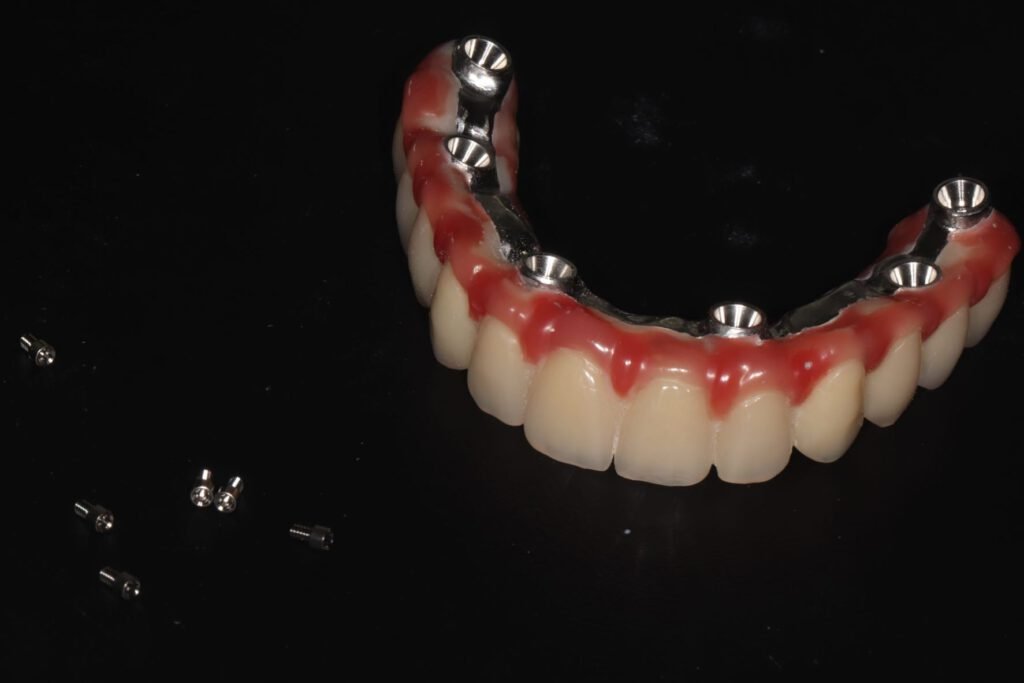
What care is required after dental prosthetics?
After the prosthetic procedure:
/ it will take some time to get used to, especially if there is more than one prosthetic tooth and if you haven’t had teeth in your mouth for a long time.
/ oral tissues will try to adapt to the new prosthesis, so sometimes it may be necessary to adjust the prosthesis and adapt it to the changed situation in the mouth.
/ don’t forget to visit the dental prosthesis clinic on time for regular preventive dental examinations and prosthesis corrections, oral hygiene.
/ take proper daily care of your teeth at home.
How to take proper care of the teeth after dental prosthetics?
1/ Correct oral hygiene is necessary. Brush your teeth with a toothbrush twice a day, and be sure to clean between your teeth with dental floss or a special interdental brush. Additionally, you can use an interdental irrigator, a special tongue scraper.
2/ Proper hygiene of removable dentures is very important. Clean them after every meal, be sure to at least rinse them with water, and if you have the opportunity, clean them with a toothbrush, using a special solution.
3/ Clean dentures with a soft brush, do not use bleaching or abrasive substances. In order not to damage the surface of the prostheses, they should be cleaned as gently as possible. Be sure to rinse the dentures with water after cleaning.
4/ Use only denture cleaning and care products recommended by your dentist, which are best suited for your dentures.
5/ If you have removable dentures, take them out at night. Exceptions to this recommendation may be made if otherwise advised by the dentist.
6/ Visit an oral hygienist regularly and clean dental plaque. The more you take care of the condition of your mouth, the lower the chance of various inflammations and other diseases and the longer the prostheses will last.
7/ Be sure to visit your dentist regularly to assess the condition of your teeth, dentures and mouth. Over time, the condition of the mouth and teeth changes, so the dentures may need to be minimally adjusted.
8/ Be careful when choosing food and drinks. Do not forget that very hard food can damage dentures, and colouring drinks can lead to the appearance of unwanted stains.
9/ A broken or cracked prosthesis must not be used, as it may damage your oral cavity. If you notice a crack or split, be sure to register with a dentist.
The professional team of doctors at our dental clinic works for the health of your teeth!



